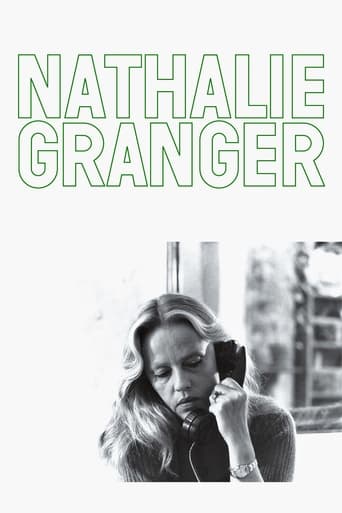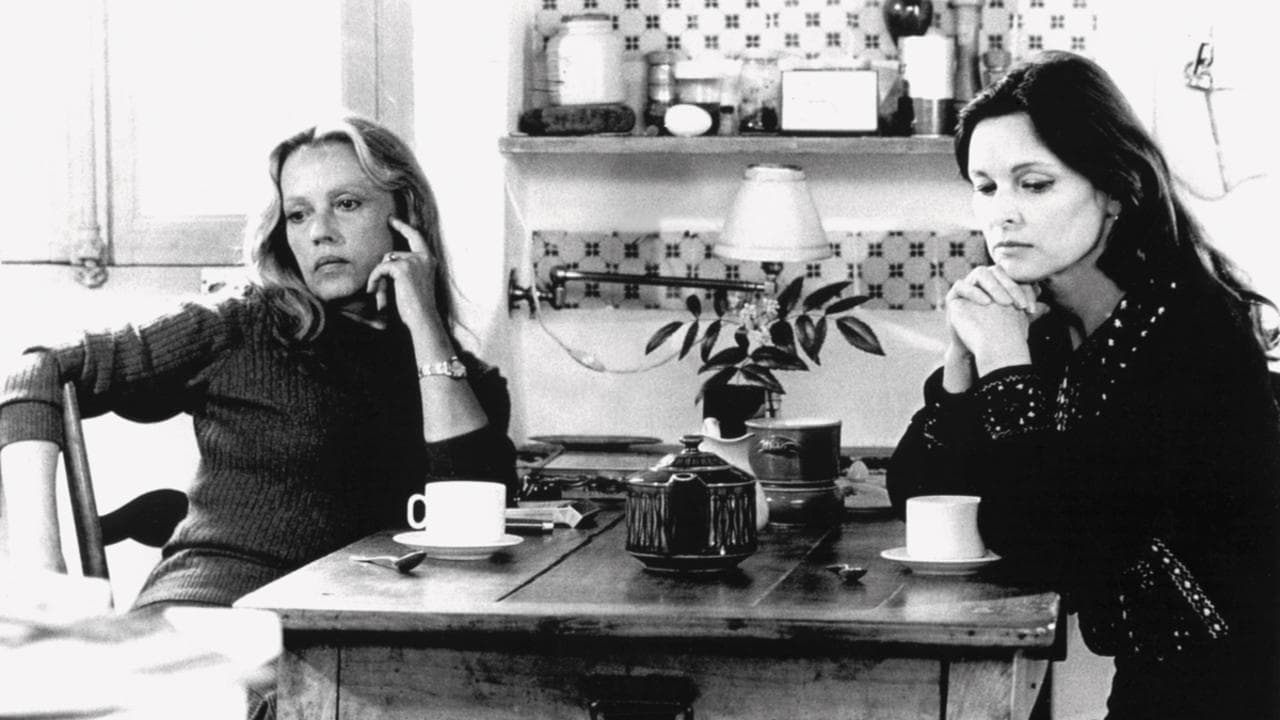sveinpa
I just saw Nathalie Granger for the first time this morning, and must say that I am now both highly impressed and deeply moved by the experience. Impressed with the professional execution of what must be a difficult script to shoot. Moved by the strange combination of quiet serenity and uneasy claustrophobia produced by the interacting of the silent femmes and the Gothic looking house, garden and pond. That this was the very house Duras lived in may also contribute to the experience.The professionalism is perhaps not so surprising. The beautiful black and white cinematography is by Ghislain Cloquet. He worked with Alain Resnais in the fifties but for me his most important work is for Robert Bresson: Au hazard Balthasar, Mouchette and Une femme douce; three of the most captivating movies I have ever seen. As for the actors, both Bose and Moreau have worked with Antonioni, and the latter of course also with Truffaut and Bunuel. The meeting of these people with the dense script of one the major writers of the time should call for the utmost attention on the side of the viewer; every scene invites close inspection as well as an open mind to what we are seeing just as much as what we are not seeing, a presence or an absence. We may not see much on the screen but, contrary to other reports on this site, I would not call Nathalie Granger a minimalist work. I find it to be as full of mystery as any tale of horror you might name, even if the means involved may be sparse. Indeed (perhaps due to dark Isabelle lurking about draped in her long, black cape by the gloomy pond in the overgrown garden), the film has as much a vampirish look as Dreyer's Vampyr or Jean Rollin's Le viol de Vampire. And this look is completely justified by the ongoing killings in the vicinity as well as the statement uttered that Isabelle's problematic daughter Nathalie "would like to kill someone". The conflict between these horrors, and the quiet mood surrounding the characters, creates a tension in a most skillful way; the effect on a receptive mind can be shattering.The professionalism therefore, might be taken for granted, but many professionally made movies do not move me. This does, and almost as much as the Bresson films mentioned above. But where Bresson, as well as Dreyer, work within a spiritual context that might more easily produce transcendence, Duras, more in tradition of Antonioni perhaps, works without spirituality, at least without the presence of spirituality. Yet I might call the effect the film has on me as transcendent. Why? It may be precisely the very absence that contributes to the paradox that this art of the void can work its mysterious wonders. Even the few, uncertain notes of Nathalie's piano practice that constantly accompanies the silence of the rooms, seem to contribute to the experience. She may be giving up music, but it seems that her life is breathing in these few notes. If the music stops, then what will happen? So, although the cinematography and the settings might create their own poetry, I think it is the story of Nathalie that moves me. We know from the school reports that Nathalie is in trouble, we also know that it is her film, at least it is named after her. Yet we do not see much of her. But we do hear her, her playing is setting the mood. And in the empty rooms, we may also look for her, even it is clear that she is not there. But we see her things: "This belongs to Nathalie, do not touch", a note says. Her absence is present. So what? So she may be in the garden chasing the black cat, but even that without much luck. When she tries to put the cat in the baby carriage, it runs away. She kicks the carriage violently over. Are we to assume some sort of correspondence between the unseen killers and the poor Nathalie? In a different script she would run away and become their victim of course, but in this film we are left to wonder about her destiny. There are many such uncertainties, and they all do their tiny bit of work on the bewildered spectators, of which at least I might say that I will certainly watch this film again, and that with still greater expectations. I do not usually become so moved by works of cinema, so any viewing that make me write a review within an instant, I will take good care of. Well, Nathalie Granger, up on the top of my shelf you go, beside the other greats. Just one hesitation, though: The interlude of the intruding washing machine salesman, hilariously played by the then fresh Depardieu, although indeed very funny in itself, might be a problem: Precisely because it seems to stand alone. With the women we might just gaze at him in wonder, and agree, as they say, that "you are not a salesman". But, I could add, we might also say: "You do not belong here", that is, in this film. But the women, however, seem amused. He could be from another planet as far as they are concerned. There are just two scenes with Depardieu, but they tend to dominate far too much, as the very presence of this big and clumsy man (which we also now may have seen too much of in later movies) is all it takes to relieve our mind of young and tender Nathalie, at least while he is on the screen. He is a spectacle in himself. The women are diverted for a while. So are we. But is this comic interlude necessary? At the moment, I am not sure, at least I cannot see why.
wkkbooks
Elliptical . . you are invited to project into the gaps. I find an atmosphere of unbearable tension, depression, grief, apprehension,watching two women living with some persistent post-traumatic stigma, unexplained, in a waiting that never ends. Something to do with the mother's unique, uncommunicable anguish over a very bad, violent, abnormal daughter. We never learn what she did or see her misbehave, we imagine the worst and her most innocent behavior seems unnerving, suggestive of evil. A double anguish, also having to do with a pair of depraved teenage boy killers on the loose in the neighborhood. Did they kill someone in the family? Or are they perhaps family members? Do the two women know something about these boys that the police don't? A numbed mood with its own rapturous nuances, separates them from the street world in front of the house, and the equally claustrophobic garden world in back of the house, the absolutely still house. Great actresses are denied the opportunity to act, a kind of negative violence which causes amazement and discomfort. By bizarre contrast, suddenly a radiant 24 year-old Depardieu, as an awkward vacuum cleaner salesman, gives a hilarious, virtuosic shaggy dog monologue out of Pinter or Beckett. Virtually his first film, it precedes his official filmography; what a discovery. The film goes nowhere, a fragment, a shard of smoky Durassian flint. The more Duras one already knows, the more one can appreciate this seemingly obscure and tedious film.
plix flooberhausen
First let me state that I am a huge fan of foreign cinema - have been for decades, so should you be dismayed by the comments that follow, write me off as a philistine at your own peril.I chanced upon this movie and reading the back cover notes on the DVD: 'Nathalie Granger is an elliptical, elusory story about the world of women in which dull domestic ritual masks an undercurrent of lurking violence', I thought, OK, I'll take a chance. Though the director is also credited as the writer, there is decidedly more writing in the liner notes on the DVD. 'Dull domestic ritual?' If that includes repeatedly walking trance-like in and out of rooms (though sometimes it's just the room sans a life form) for no particular reason, staring off into the distance for interminable periods of time, a lack of what humans have come to know and embrace as conversation, so much so that it could be described as monasterial, the comatose deportment of all but 1 of the 7 characters, a cavernous void where a story might reside, well, then I'd say that the description hits the nail on the head - which I suppose, would account for the undercurrent of violence. Overall, the film lacks the sort of cohesion that would bind you to the experience, and comes across as a series of scenes without narrative or resolution of any kind. While I do appreciate minimalist cinema, this takes 'elusory' to as close to infinity as is possible with celluloid. So, if you are looking to for the kind of cinematic experience that is as riveting as staring at an unpainted wall, then this is your film! Though for me, I would like my 83 minutes back, please.
sleepsev
Though I don't know anything about French social contexts during the 1960's and 1970's, though I haven't read any of Duras' works, though I can't figure out what is the message behind this movie, I still feel "Nathalie Granger" is one of the most beautiful films ever made. The beauty of "Nathalie Granger" doesn't come from its visual quality nor the objects it depicts, but from its serenity and the way things are represented. I have to quote the phrase "makes my heart cave in" from "American Beauty" to describe my feeling for this movie, because that's what I really feel, and the feeling I get from "Nathalie Granger" is in a way similar to the feeling I get from the dancing plastic bag scene in "American Beauty,"though "Nathalie Granger" is not didactic at all. As for me who don't understand any symbols hidden in "Nathalie Granger," the great sense of enjoyment I get from this movie comes from its sublimation of simple things and of domestic chores. Duras makes me look at simple things again in such amazement, such wonder, such astonishment of how beautiful they actually are.For me, the table cleaning scene is one of the greatest scenes in cinematic history. Though I might have seen people clearing tables a thousand times in my life, I still feel I have never seen anything like this scene before. Duras can capture the beauty and the charm of simple things into her film, and by representing them like something we have never seen before, she also captures the hearts of the audience. Another thing that impresses me a lot is the performance of Lucia Bose, especially in the scene with Gerard Depardieu. I like the expression on her face very much when she listens to the salesman. The radio broadcast about murderers at large is another thing that I like. There are also many other extraordinarily beautiful and calm scenes in this movie: the tearing up of paper, the piano playing, the characters' walking, the things that they do with leaves, and the shots of a baby carriage. I describe only my feelings here, not the meaning of this movie, because a few books have already deciphered it. Though I'm aware that the feeling I get might not be what Duras intended, I still feel very grateful for her for opening my eyes to see a wonderful kind of beauty, and for giving me a rare and precious sense of "nonconforming serenity."


 AD
AD


